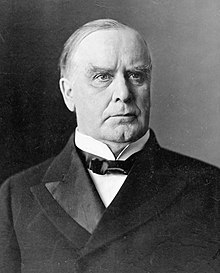William McKinley
| William McKinley | |
|---|---|
 |
|
| 25th President of the United States | |
|
In office March 4, 1897 – September 14, 1901 |
|
| Vice President |
|
| Preceded by | Grover Cleveland |
| Succeeded by | Theodore Roosevelt |
| 39th Governor of Ohio | |
|
In office January 11, 1892 – January 13, 1896 |
|
| Lieutenant | Andrew L. Harris |
| Preceded by | James E. Campbell |
| Succeeded by | Asa S. Bushnell |
| Member of the U.S. House of Representatives from Ohio's 18th district |
|
|
In office March 4, 1887 – March 3, 1891 |
|
| Preceded by | Isaac H. Taylor |
| Succeeded by | Joseph D. Taylor |
|
In office March 4, 1883 – May 27, 1884 |
|
| Preceded by | Addison S. McClure |
| Succeeded by | Jonathan H. Wallace |
| Member of the U.S. House of Representatives from Ohio's 20th district |
|
|
In office March 4, 1885 – March 3, 1887 |
|
| Preceded by | David R. Paige |
| Succeeded by | George W. Crouse |
| Member of the U.S. House of Representatives from Ohio's 17th district |
|
|
In office March 4, 1881 – March 3, 1883 |
|
| Preceded by | James Monroe |
| Succeeded by | Joseph D. Taylor |
|
In office March 4, 1877 – March 3, 1879 |
|
| Preceded by | Laurin D. Woodworth |
| Succeeded by | James Monroe |
| Member of the U.S. House of Representatives from Ohio's 16th district |
|
|
In office March 4, 1879 – March 3, 1881 |
|
| Preceded by | Lorenzo Danford |
| Succeeded by | Jonathan T. Updegraff |
| Chairman of the House Ways and Means Committee | |
|
In office March 4, 1889 – March 4, 1891 |
|
| Preceded by | Roger Q. Mills |
| Succeeded by | William M. Springer |
| Personal details | |
| Born |
January 29, 1843 Niles, Ohio, U.S. |
| Died |
September 14, 1901 (aged 58) Buffalo, New York, U.S. |
| Cause of death | Assassination |
| Resting place |
McKinley National Memorial Canton, Ohio |
| Political party | Republican |
| Spouse(s) | Ida Saxton (m. 1871) |
| Children | 2, including Katherine ("Katie") |
| Education | |
| Profession | |
| Religion | Methodism |
| Signature | |
| Military service | |
| Allegiance | |
| Service/branch | |
| Years of service | 1861–1865 (American Civil War) |
| Rank | |
| Unit |
|
| Battles/wars | American Civil War |
| The McKinley Cabinet | ||
|---|---|---|
| Office | Name | Term |
| President | William McKinley | 1897–1901 |
| Vice President | Garret A. Hobart | 1897–1899 |
| none | 1899–1901 | |
| Theodore Roosevelt | 1901 | |
| Secretary of State | John Sherman | 1897–1898 |
| William R. Day | 1898 | |
| John M. Hay | 1898–1901 | |
| Secretary of Treasury | Lyman J. Gage | 1897–1901 |
| Secretary of War | Russell A. Alger | 1897–1899 |
| Elihu Root | 1899–1901 | |
| Attorney General | Joseph McKenna | 1897–1898 |
| John W. Griggs | 1898–1901 | |
| Philander C. Knox | 1901 | |
| Postmaster General | James A. Gary | 1897–1898 |
| Charles Emory Smith | 1898–1901 | |
| Secretary of the Navy | John D. Long | 1897–1901 |
| Secretary of the Interior | Cornelius N. Bliss | 1897–1899 |
| Ethan A. Hitchcock | 1899–1901 | |
| Secretary of Agriculture | James Wilson | 1897–1901 |
William McKinley (January 29, 1843 – September 14, 1901) was an American politician and lawyer who served as the 25th President of the United States from March 4, 1897 until his assassination in September 1901, six months into his second term. McKinley led the nation to victory in the Spanish–American War, raised protective tariffs to promote American industry, and maintained the nation on the gold standard in a rejection of inflationary proposals.
McKinley was the last president to have served in the American Civil War, beginning as a private in the Union Army and ending as a brevet major. After the war, he settled in Canton, Ohio, where he practiced law and married Ida Saxton. In 1876, he was elected to Congress, where he became the Republican Party's expert on the protective tariff, which he promised would bring prosperity. His 1890 McKinley Tariff was highly controversial; which together with a Democratic redistricting aimed at gerrymandering him out of office, led to his defeat in the Democratic landslide of 1890. He was elected Ohio's governor in 1891 and 1893, steering a moderate course between capital and labor interests. With the aid of his close adviser Mark Hanna, he secured the Republican nomination for president in 1896, amid a deep economic depression. He defeated his Democratic rival, William Jennings Bryan, after a front-porch campaign in which he advocated "sound money" (the gold standard unless altered by international agreement) and promised that high tariffs would restore prosperity.
...
Wikipedia
